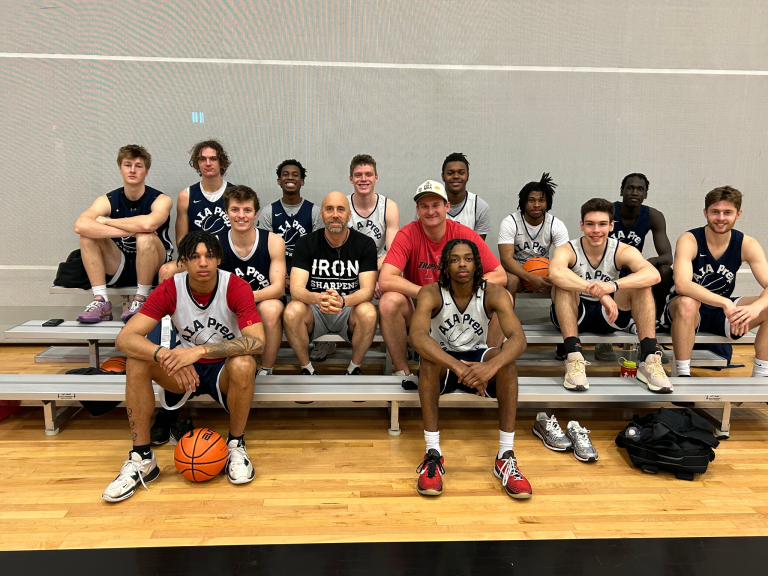Article
10 Characteristics of a Great Teammate: Part II
What does a transformational teammate look like?
Brian Smith
Never Miss a Play
Get weekly articles on sport culture, relationships, and identity.
Every team needs great teammates.
But what does it mean for a teammate to be great? How do you measure greatness in this sort of context? The life of Jonathan—specifically his relationship with David—gives us a grid for what it truly looks like to be a great teammate.
Here is the second part of a two-part series aimed at giving athletes practical and biblical wisdom on how to love their teammates well. (You can read the first five here.)
THEY DO NOT HAVE A HIDDEN AGENDA
“Then Jonathan made a covenant with David, because he loved him as his own soul. And Jonathan stripped himself of the robe that was on him and gave it to David, and his armor, and even his sword and his bow and his belt.” 1 Samuel 18:3,4
Jonathan was all in on his friendship and loyalty to David. What we see in these verses is Jonathan giving up everything given to him and everything he worked for in submission to David. It is evident that Jonathan was not just trying to get on David’s good side so he could leverage that position later. His words and his actions reflected his heart’s desire.
Great teammates truly want what is best for others on the team. Their actions and words are not just a ploy to get back in the coach’s good graces, but they are an overflow of a desire to see others succeed. Even if it comes at significant cost to them.
Great teammates embrace the call to “love your neighbor as yourself.”
THEY SPEAK WELL OF THEIR TEAMMATES PRIVATELY
“Then Jonathan said to David, ‘Whatever you say, I will do for you.’” 1 Samuel 20:4
When David was desperate, he came to Jonathan. He knew that Saul wanted him dead. Jonathan did not say “good luck” or “I will keep you in my prayers.” He looked his friend in the eye and said: “I will do anything you ask me to do.”
Great teammates do not put limits on what they will do for others. They are willing to be inconvenienced to help their teammate get out of a jam. This stands in opposition to the me-centered attitude of our sports culture.
This willingness to help comes out of a growing awareness of the lengths to which Jesus went to serve and sacrifice for us. If sin didn’t get in the way for Him, surely we can’t let sport get in the way for us.
THEY ENTER INTO THEIR TEAMMATE’S PAIN
“And Jonathan rose from the table in fierce anger and ate no food the second day of the month, for he was grieved for David, because his father had disgraced him.”
“And as soon as the boy had gone, David rose from beside the stone heap[a] and fell on his face to the ground and bowed three times. And they kissed one another and wept with one another, David weeping the most.” 1 Samuel 20:34,41
Saul finally reached his tipping point. He expressed to Jonathan his disdain for him as a son and his intentions to kill David. In a moment when he had every right to isolate himself and recover from the personal attacks of his father, Jonathan chose to hurt of David. At that moment, he decided to enter into his friend’s pain rather than his own.
Great teammates allow themselves to hurt and enter into the pain of others. If a teammate gets injured, they imagine what it must be like to be that person’s shoes. If a teammate loses or performs poorly, they encourage them and try to lift their spirits. Great teammates do not try to fix the problem or minimize the pain. They use phrases like: “I’m really sorry.” “I can’t imagine what you’re going through.” “What do you need from me?” “I’m in your corner.”
ROMANS 12:15
Rejoice with those who rejoice, weep with those who weep.
THEY CELEBRATE THEIR TEAMMATE’S SUCCESS
David did not have many celebratory moments recorded in the Bible during his friendship with Jonathan. It is not a dangerous assumption, however, to believe that when good things happened to David, Jonathan was joyfully celebrating with him.
Romans 12:15 implores believers to “rejoice with those who rejoice.” Great teammates enter into the joy and celebration of others. Sometimes a teammate’s success will come at the cost of your own. If you can’t muster up the energy in your heart to find happiness for them, it becomes an opportunity for you to confess that to the Lord and repent.
An inability to celebrate others is a terrible, joy-robbing reality to live in. Great teammates embrace the call to “love your neighbor as yourself.” Part of loving your neighbor—and your teammate—is being happy when good fortune comes their way.
READ THE LATEST
Where sport culture, relationships, character, identity, and faith collide.

